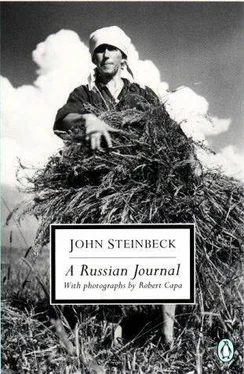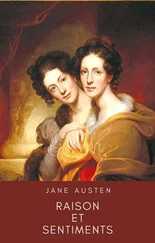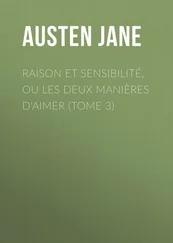At its best, all of Steinbeck's journalism captures with unflagging empathy the commonplace yet telling angle or story. Throughout the 1950s and 1960s, the writer turned to journalism with greater and greater frequency, willing to finance trips abroad by writing articles, eager to see for himself what events absorbed the world. In the early 1950s he wrote most of his travel articles, some of the best of these on an American in Paris in 1954, published in Le Figaro. In 1966, a weary and unwell Steinbeck traveled to Vietnam to witness war once again. The record of this trip is sketched in a remarkable series, "Letters to Alicia." Steinbeck, argues biographer Jackson Benson, needed "to be on the scene, where things were going on-it was part of his restlessness-which was similar to the compulsion, or perhaps addiction, that some journalists have to rush to the eye of the storm."
In 1946 and 1947, John Steinbeck experienced personal and professional anguish that mirrored the dark uncertainty of the emerging cold war face-off. As his newly purchased house on East Seventy-eighth Street in New York City was being remodeled around his "working cellar… gray concrete walls and cement floors and pipes overhead," his marriage was slowly crumbling. With bravado, he declared himself happy in his four-year union to Gwyn Conger, content with his status as a father to two young sons. But the truth of his situation was far less sanguine: he had difficulties sustaining interest in his new novel, The Wayward Bus, published in February 1947; he anxiously sought to create the perfect working space, even toying with the idea-as he notes in a diary he kept for the year-of writing in a completely dark room. In nuanced phrases, he voices his suspicions that Gwyn was having an affair. And with characteristic force, he blasts the world outside his study:
Our leaders seem to be nuts. If ever a nation was being dragged over the edge of folly into destruction this is it. God help us!… [Times are] growing more complicated to the point which a man can't even see his own life let alone control it. What a time. What a time. We will have our nice house put in to get it bombed. But so will everyone else. So I go on writing an unimportant novel that carefully avoids anything timely…
Throughout this dark time, the novelist at odds with both wife and world toiled sporadically on other projects, interrupting the slow progress on "The Bus." His writing took on an increasingly insistent moral edge as he attempted to come to terms with the irrationality and complexity of postwar America. On October 15, 1946, he sketched a piece called "The Witches of Salem," a synopsis of an idea for a motion picture "intended to be a film treatise on public hysteria and injustice." From that aborted project came another, "The Last Joan," a play that "has to do with witchcraft. And that in a modern sense we better heed what the present Joan tells us of the atom bomb, because it's the last time that we'll have a Joan to tell us what to do." Behind all of these projects and voiced dissatisfaction with contemporary life was, undoubtedly, the urge to escape-his country, his unhappy home situation. In 1945, he'd turned down a request to cover the war trials in Europe. A trip to the Soviet Union, sponsored by the New York Herald Tribune, promised relief. He'd been there once briefly in the summer of 1937 with his first wife, Carol (not 1936, as he notes in the book), and he wanted to see how the country had been transformed by war.
But the trip promised more, the chance to experiment as a writer. As he was completing The Wayward Bus Steinbeck wrote in his journal: "I have finally worked out what I could do in Russia. I could make a detailed account of a journey. A travel diary. Such a thing has not been done. And it is one of the things people are interested in. And it is the thing I could do and perhaps do well and it might be a contribution." At this juncture, when his novels and play synopses were not bearing fruit-novels seemed insignificant, outlines for plays heavily allegorical-journalism promised discipline, relevance, and a guaranteed audience for the forty-five-year-old writer. And a "journal" offered an opportunity to experiment with prose honed to photographic integrity.
In 1947, the acclaimed war photographer Robert Capa, age thirty-three, was also at loose ends, although "very happy to become an unemployed war photographer." Early that year he had finished preparing for press a collection of war photographs with personal narrative, Slightly Out of Focus. He needed a new photographic challenge in a world ostensibly at peace, and he had long wished to visit the Soviet Union. Ever since 1935 when the Hungarian-born Endre Friedmann had invented himself as Robert Capa, a rich American photographer covering Paris, the irrepressible Capa had famously recorded images of several wars, participat-ing in the Normandy invasion for Life in 1944: "… for a war correspondent to miss an invasion," he said, "is like refusing a date with Lana Turner after completing a five-year stretch at Sing Sing." His reputation was made during the Spanish Civil War with a riveting shot of a soldier falling before Fascist machine-gun fire. In 1938, mourning the death of his beloved companion, Gerda, who had died in the battle of Brunete, he went to China to witness the Chinese and Japanese conflict, finding himself at the end of that year a celebrated international photographer. That he remained. "Far from being an impassive voyeur who merely observed from a safe vantage point," notes his boigrapher, "he cared deeply about the outcome of the war against fascism and was always ready to risk his life to get great photographs." "What makes Capa a great photo journalist?" asks a reporter covering a 1998 retrospective of his work. "We see his own appetite for life, his mix of urgency with compassion… the artistic thrust of his photography always had more to do with its emotional pitch, which remained genuine and deeply felt." Or, in Capa's own words, a great picture "is a cut out of the whole event which will show more of the real truth of the affair to some one who was not there than the whole scene."
Dedicated to the telling pose and psychological truth, Robert Capa was John Steinbeck's artistic soul mate. As Steinbeck wrote in a tribute to Capa after the photographer's untimely death in 1954: "He could photograph motion and gaiety and heartbreak. He could photograph thought. He made a world and it was Capa's world. Note how he captures the endlessness of the Russian landscape with one long road and one single human. See how his lens could peer through the eyes into the mind of a man."
The collaboration between these two restless and creative men, notes Robert Capa, began this way: at the beginning of a newly invented war which was named the cold war… no one knew where the battlefields were. While I was figuring what to do I met Mr. Steinbeck, who had his own problems. He was struggling with a reluctant play, and the cold war gave him the same shivers it gave me. To make it short, we became a cold-war team. It seemed to us that behind phrases like "Iron Curtain" "cold war" and "preventive war" people and thought and humor had fully disappeared. We decided to make an old-fashioned Don Quixote and Sancho Panza quest-to ride behind the "iron curtain" and pit our lances and pens against the windmills of today.
Capa's whimsical statement of purpose reveals, in fact, something about why A Russian Journal is in many ways superior to more ambitious, even more informative contemporary accounts of postwar Russia. Typical is an apologist for the Soviet experiment, Dr. Hewlett Johnson, dean of Canterbury (Soviet Russia Since the War, 1947), who intones that it is "our responsibility to understand Russia," and offers a smorgasbord of topics: "A Young Woman of Aristocratic Birth," "Soviet Women Lead the World," "Childhood in Soviet Land," "Planned Industry." Steinbeck and Capa's aim was far more modest; and, unlike Johnson, they had no political agenda.
Читать дальше











